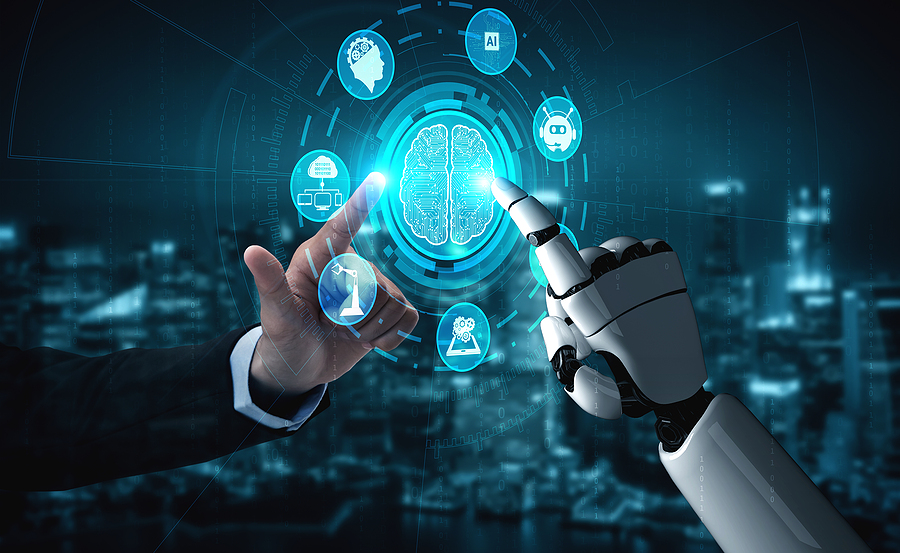No longer is artificial intelligence relegated to the annals of science fiction; AI is here, in almost every aspect of our everyday lives. Perhaps the best example of how far AI has come — and how essential it has become to human success — is in healthcare, where AI is already in use in the following ways:
1. AI to Reduce Errors
Table of Contents
Healthcare providers are human, and while extensive training and exhaustive continued education works to equip them with the best knowledge and skills for treating patients, the fact remains that providers are bound to make some mistakes. Fortunately, AI can help reduce the frequency and severity of those mistakes. Some AI tools currently used to minimize errors and improve patient outcomes include:
- Buoy Health: This AI chatbot talks to patients and scans the conversation for symptoms and health concerns, then diagnoses illnesses and recommends treatment.
- Enlitic: This deep learning medical tool works with providers to analyze unstructured medical data like PACS radiology images, blood tests, and patient medical history.
- PathAI: This machine learning tool works with pathologists to improve cancer diagnoses and develop individualized medical treatment.
2. AI to Develop New Medicine
Drug development is remarkably expensive because it requires long, laborious testing to ensure that pharmaceuticals are safe and effective. AI tools can be invaluable in helping drug companies identify compounds that can be useful in drug development, and AI can also help pharmaceutical makers find new uses for drugs that are already on the market. Some examples of AI tools used in pharmaceutical creation and testing include:
- Atomwise. This AI helps to identify patient characteristics for drug clinical trials, especially to combat some of the most serious diseases, like Ebola and multiple sclerosis.
- BioXcel Therapeutics. This AI specializes in identifying new drugs and finding new applications for old drugs in the fields of immuno-oncology and neuroscience.
- Deep Genomics. This AI platform focuses on finding developmental drugs for neuromuscular and neurodegenerative disorders, like Parkinson’s and Alzheimer’s.
- XtalPi. This drug discovery platform combines AI, the cloud and quantum physics to predict chemical properties and small molecules for drug design.
3. AI to Improve Patient Experience
No patient wants to be rushed through the healthcare system. However, hospitals, clinics and other healthcare providers need a way to streamline the patient experience to reduce waste and improve outcomes for as many patients as possible. Fortunately, AI can help. Far from being cold, emotionless robots, AI tools can improve patient experiences by helping hospital staff identify pain points and bearing some of the responsibility for patient services. Already, these providers are using AI in this way:
- Babylon. This comprehensive health platform includes all manner of AI-assisted patient-facing tools, like symptom checkers, health monitoring systems, medical information update portals and more.
- Olive. This AI platform automates the most repetitive tasks of the healthcare industry to give providers more time and energy to devote directly to patients.
- Twin Health. This combination of AI, data science and IoT technology helps patients make a digital twin that can generate personalized health advice.
4. Ai to Manage Medical Data
Healthcare runs on data, but woefully few healthcare providers are leveraging Big Data in a meaningful way. AI tools can make the extraordinary amounts of data generated in healthcare more practicable for healthcare providers. The following AI tools are helping to mine and manage medical data today:
- Tempus. This AI searches the world’s collection of clinical and molecular data to create a massive data library and develop personalized healthcare treatment.
- KenSci. This AI tool helps providers predict clinical, financial and operational risks by crunching all sorts of data generated by hospitals.
- Proscia. This pathology platform uses AI to connect data points regarding cancer discovery and treatment to help streamline the process of diagnoses and treatment for providers and patients.
Learning about AI in healthcare is critical for those working in the healthcare field, and it is equally important for those interested in developing impactful AI solutions. While AI is already in use, healthcare providers and AI developers can undoubtedly find more ways AI can save time, money and lives within the healthcare industry.
Image Source: BigStockPhoto.com (Licensed)
Related Categories: Tech, Health, Reviews








